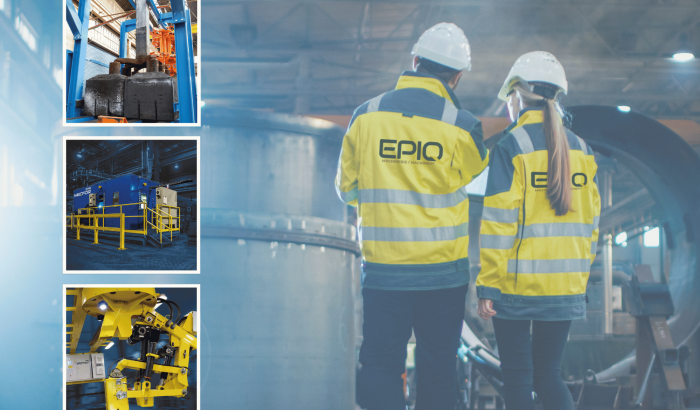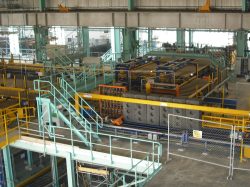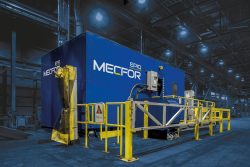Rooted in the MENA Region: EPIQ looks to a bright future

1) How has your equipment helped aluminium companies in the Middle East enhance production and improve operations? Can you share a case study?
EPIQ Machinery has played a significant role in enhancing the productivity and operational efficiency of aluminium companies in the MENA region, particularly in the Kingdom of Bahrain. EPIQ reduced downtime and improved productivity by addressing key issues such as machine availability and high maintenance costs
Thus, EPIQ supplied and is still supporting several equipment in the Middle East, mainly in the carbon sector with its BROCHOT rod shop solutions, its AD anode handling systems as well as its MECFOR anode slot cutting machines. Through its proximity and constant interaction of its team, EPIQ responds quickly to customer needs by offering a wide range of services with a proactive approach, aiming for optimal and sustainable performance of these equipment.
As well, with the recent acquisition of the mines and metals division of Alizent Canada and USA operating under the EPIQ Digital, we are supporting the MES software of a majority of aluminum plants in the Middle East, assuring the most efficient production process possible.

AD – Anode Handling System
Case Study
The local EPIQ MENA team was called to resolve an issue of equipment availability dropping below 80% at one of GCC smelter carbon plant. This problem was affecting production and increasing operational expenses (OPEX) due to frequent machinery breakdowns and high maintenance costs.
To solve the problem, EPIQ’s expert team conducted a zero-point audit of the carbon plant equipment in carbon. Being in close proximity, the team regularly visited the plant, interacted with staff, and studied the issues in detail to get to the root of the problem. The team found that certain specific components were not functioning properly, leading to failures in other parts and causing continuous breakdowns.
Subsequently, the EPIQ team took several corrective steps to enhance the reliability of machinery and production capacity. They optimized systems, made changes to the production line setup, and ensured that all components were functioning correctly. This included improvements to lubrication, systems, upgrades to certain parts, and changes to the maintenance and inspection program.
As a result of this process, equipment availability in the plant increased by 10% and OPEX decreased by 20%. Additionally, the team taught to plant operators the best practices for proper maintenance and operation, ensuring long-term improvements.
The continuous presence of the EPIQ team in MENA and deep engagement with the plant helped in quickly resolving issues and providing optimized solutions.
2) The Middle East is emerging as a significant global hub for aluminium production. Recently, Saudi Arabia announced that it would double its investments to become one of the top ten aluminium producers in the world. How do you plan to tap this opportunity?
Our approach is to stay as close as possible to our customers, as to always generate value with each interaction. With our Bahrain service centre situated within driving distance from the Saudi Arabia aluminium production sites, we are ideally located to execute on this strategy. Combining our ability to support both the design phase imperative and the site once in production is an advantage EPIQ brings when customers are contemplating investments.
Strategic Location: Bahrain’s proximity to Saudi Arabia and other major Middle Eastern markets is a significant strength. Being in the same time zone and geographically close allows us to respond quickly and collaborate closely with customers. This helps us meet their production needs promptly and effectively. Moreover, we can provide immediate support, which is crucial for continuous production.
Local Expertise and Workforce: A major advantage of EPIQ is that we have a skilled local workforce that understands the business practices and cultural aspects of the region well. Our team is familiar with the specific needs of aluminium producers in the Middle East, enabling us to provide tailored solutions according to technical and operational requirements. Additionally, the knowledge of the local workforce helps us effectively manage customer relationships and day-to-day operational activities in MENA.
Agility and Competitiveness: EPIQ provides more personalized, agile, and responsive services compared to competitors. While global companies are strong due to their vast resources, EPIQ is also an international company that benefits from a local presence and focused approach. As a result, we can offer more customized solutions, faster delivery times, and a better understanding of the specific needs of regional clients.
Previously, many of our team members held key positions in the aluminium smelter industry. Now, they are part of EPIQ’s expert team, and their smelter engineering experience provides a significant advantage in working with our clients. This experience further strengthens EPIQ and sets us apart from our competitors.
Cost-effectiveness and Efficiency: Operating in Bahrain, we are able to optimize costs. Since the cost of doing business in Bahrain is lower compared to other regions, we can pass these savings on to our clients in Saudi Arabia.
Understanding customer needs and culture: The EPIQ team, with its local expertise, has a good understanding of the business culture and practices in Saudi Arabia and the wider Gulf region. We know how to communicate effectively and understand the specific needs of customers, whether it is technical specifications, delivery timelines, or after-sales service. This deep understanding allows us to better meet the needs of the growing aluminium industry in the region.
With all these strengths, EPIQ is fully prepared to take advantage of the growing opportunities in the aluminium industry in Saudi Arabia. Our local presence, specialized knowledge, and commitment to providing high-quality machinery and support enable us to play a significant role in shaping the future of the aluminium production sector in Saudi Arabia.
3) How do you foresee your auto-guided vehicle technology to perform in the aluminium industry? How is your vehicle unique from the rest in the market?
EPIQ has a unique approach in the AGV segment. First, we decided to partner with a renowned AGV manufacturer to design an AGV that can count on solid references in the heavy industry, enhanced with EPIQ precise knowledge of the aluminium applications. Second, the EPIQ AGV is thus design on proven technology and can work in magnetic fields, resist to heat and dust as well as manage in plant coactivity. Our goal is to be able to move crucibles and anode trays with AGV’s, safely and reliably.
However, the quality of the vehicle is not enough. The system requires an efficient fleet management tool to assure optimal movements of all the equipment. In addition to this, through our Innexus OMS software provided by EPIQ Digital, we can manage the orders from the process, eliminating the paper base traditional order management approach. If there are no more operators, this automated order management is a must!
Finally, now that the aluminium plant can rely on a powerful software to manage the movement of its vehicles, it is easy to add a variety of digital value add-on solutions, such as asset tracking and just in time methods.
4) Do you foresee a booming market for AGV technology in the Middle East when aluminium producers largely aim to reduce carbon emissions across their operations?
Yes, but the carbon emissions is only a part of the driver towards AGV’s. Safer operations, enhance production and digitalization of the overall process are big drivers as well.
5) Which of your equipment has been most popular in the Middle East aluminium industry? How do you plan to promote your machines in the Middle East region in 2025?
Our most popular machines in the aluminium industry of the Middle East include the anode handling and cleaning machine (AD), the anode slot cutting machine (MECFOR), and the pot ramming as well as the ingot casting handling system (BROCHOT). Additionally, we also provide carbon rodding shop equipment, which is highly prevalent in aluminium smelters in the MENA region.
So far, we have installed a total of nine (9) MECFOR anode slot cutting machines in several GCC aluminium smelters, and our anode handling and cleaning machines have been successfully operational since 1992.
Our company’s proximity in the region, availability of machines, and low OPEX costs are naturally making our products popular among other smelters as well. Additionally, we are working towards implementing Industry 4.0 through the EPIQ Digital MES solution, which no other provider is currently offering in the aluminum smelting industry.
Our deep understanding of material handling and our commitment to innovation provide us with a strong position in this field, enabling us to keep our customers informed about the latest trends and solutions in the industry.

MECFOR – Anode Slot Cutting Machine (ASCM)

BROCHOT – Pot Ramming Machine
6) How do you think the Middle East aluminium market growth will benefit the technology providers?
The Middle East aluminium producers are at the forefront of innovation, so its growth is fundamental for the improvement of technology dedicated to the industry. The constant drive and involvement of the Middle East plants in creating value through innovation makes it easy to invest in new ideas.
By Vivek Kumar, MENA Regional Director
This article was featured in the Aluminium Middle East: Focus 2025 edition (Vol. 30, March 2025) of the e-Magazine AL Circle, on pages 53-61.